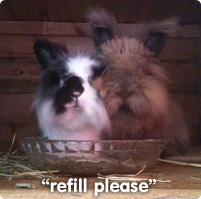What do rabbits eat?
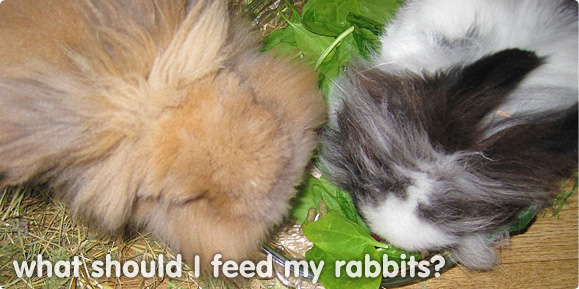
A domestic rabbit's diet should mimic the wild as much as possible, with plenty of hay and grass with smaller portions of greens and pellets. Never change a rabbit's diet suddenly as this can trigger digestive upset, especially in babies or rabbits that are stressed (eg. from a move) which can be fatal. Do it gradually over a few weeks and feed lots of hay.
Hay and grass - most important part of diet
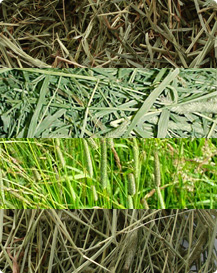 Hay is the most important part of a rabbit's diet and should make up 80-90% of it (yes really!) and buns need to have access to UNLIMITED fresh hay all day. There are lots of different types about with varying colours of green so you'll be sure to find one your rabbits love. Mix a few together to give your bunnies a range of textures to help wear their ever-growing teeth down. Many of the bags of hay in shops are cheap and nasty with short, yellow, dusty strands, so look for a shop which has a wide range. Farms sell large bales for a few pounds which will last months. Unlimited good quality hay is the foundation of a healthy diet for a pet rabbit; it not only keeps them occupied for long periods of time, which reduces boredom and helps prevent behavioural problems, but it also keeps the teeth trim, the jaw strong and provides fibre to maintain healthy gut movement. Unappealing to human tastebuds but great for rabbits! Please read more about different hays available and why hay is so important to your rabbit's health on our page: Hay, hay and more hay.
Hay is the most important part of a rabbit's diet and should make up 80-90% of it (yes really!) and buns need to have access to UNLIMITED fresh hay all day. There are lots of different types about with varying colours of green so you'll be sure to find one your rabbits love. Mix a few together to give your bunnies a range of textures to help wear their ever-growing teeth down. Many of the bags of hay in shops are cheap and nasty with short, yellow, dusty strands, so look for a shop which has a wide range. Farms sell large bales for a few pounds which will last months. Unlimited good quality hay is the foundation of a healthy diet for a pet rabbit; it not only keeps them occupied for long periods of time, which reduces boredom and helps prevent behavioural problems, but it also keeps the teeth trim, the jaw strong and provides fibre to maintain healthy gut movement. Unappealing to human tastebuds but great for rabbits! Please read more about different hays available and why hay is so important to your rabbit's health on our page: Hay, hay and more hay.
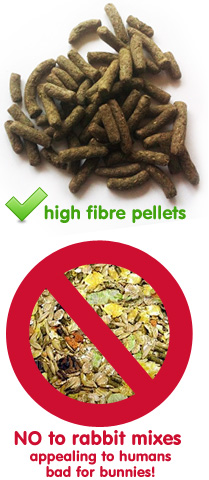 Pellets
Pellets
Pellets are recommended over a food mix, especially for rabbits feeding together as it prevents selective feeding. This is when rabbits pick out their favourite bits of rabbit mixes and leave out other nutrients, and two or more rabbits together eat different components of the mix. Unhealthy ingredients in muesli-style foods are high in sugar and starch; these are difficult for rabbits to digest and can lead to health problems and obesity.
Pellets are high in fibre and contain an even spread of nutrients in each pellet. Your bunnies' bowl shouldn't be constantly full with pellets, in fact they only need a small handful per day. Bunnies that don't eat enough hay will eat more if you cut back on pellets.
Vegetables
Rabbits love variety and fresh vegetables are a great source of nutrients for them. Introduce new vegetables slowly and a little at a time, giving your rabbits breaks if there is any sign of digestive upset. Try to select a minimum of 3 types of greens daily. Each type of veggie will provide not only different nutrients, but also different chewing motions to aid with wearing teeth down. Remember to thoroughly clean all produce to get rid of pesticides. Try giving a wide range of vegetables and mix it up throughout the week. See our Safe fruit, veg, herbs and plants page for ideas. A good guideline is to feed a minimum of 1 cup of vegetables for each 4 lbs of body weight per day.
Foraging material
You can buy packets of mixed dried leaves, flowers and twigs from pet shops which you can mix a little in with their hay. In the wild rabbits spend most of their time sniffing around and foraging, so this is great to keep them busy and makes their hay more interesting too. You don't have to feed rabbits out of bowls either, try hiding their veg and treats in the hay.
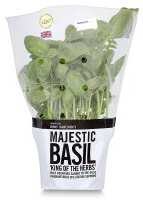 Plants, herbs, weeds and flowers
Plants, herbs, weeds and flowers
Mimic wild rabbits' food by providing your bunnies with plants, herbs and weeds. You can pick these from your garden (make sure there are no pesticides on them, and don't pick from roadsides due to traffic fumes) or you can buy herbs from supermarkets. Lily and Billy love the 'living herbs' they can eat straight from the pots, such as basil, parsley, and coriander. See our List of safe foods and plants page for what's safe, and Poisonous plants and foods to avoid to know what not to pick from your garden (or you could even remove them altogether if your rabbits have free range time outside).
Fruit
Fruit should be classed as a treat - even though it's nutritious, it's also high in sugar which can upset their stomachs causing an imbalance in the healthy gut bacteria, leading to serious problems such as obesity or death. Therefore it needs to be fed in moderation, roughly up to 2 tablespoons worth per day.
Treats
Rabbits have a sweet tooth and love treats. They would happily eat them all day instead of their hay so you must refuse their cute begging faces and make sure they get a balanced diet! They will readily take human food from you even though it is very bad for them, so please don't allow them to eat any human food or starchy goods such as bread, rice, potatoes, biscuits, chocolate, sweets, crisps etc. Suitable treats for bunnies are small chunks of fruit and veg eg. Carrot, apple, broccoli, herbs.
See our treats page for more examples.
Water
Rabbits should have access to fresh water all day every day. A ceramic dish is best as it's harder to tip over, and the more natural way they can drink from it (compared to a bottle) usually encourages them to drink more.

